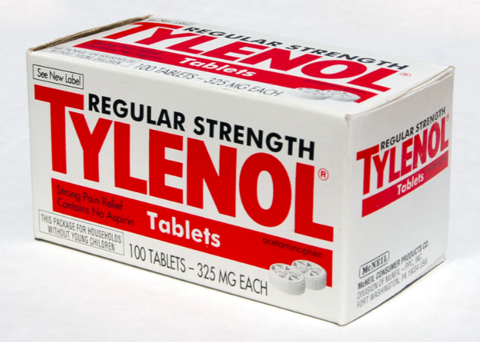A New Risk Associated With Tylenol
It seems like Tylenol can’t catch a break.
Tylenol, also known by its generic name acetaminophen, has a laundry list of problems associated with it.
Recent studies show that it’s much likelier to cause liver damage than we once thought. It’s also been linked to deadly skin reactions, and new research indicates there might be a risk of childhood ADHD in children whose pregnant mothers took the drug during the pregnancy.
While the medical field certainly has noticed an increase in ADHD over the years, we’re not quite sure why.
Perhaps one of the links to this disturbing trend is Tylenol.
Conservative estimates are that 70% of women use Tylenol during pregnancy in the U.S. That’s millions of women taking one of the most common OTC drugs on the market. The association between OTC drugs and ADHD has long been suspect and to help shed some light on the association between Tylenol and ADHD, researchers in Norway and Denmark did surveys on the mental condition of children born to mothers taking Tylenol.
A Norwegian study in 2013 discovered that mothers who had taken Tylenol for at least 28 days during pregnancy had children with a higher risk of motor and cognitive deficits at 3 years old.
In this study researchers took data on 14,744 children born between 1999 and 2009. They also took data on 95,242 mothers and 75,217 fathers.
In the study, nearly 50% of the mothers took Tylenol during the pregnancy.
It wasn’t as if taking Tylenol absolutely produced ADHD. They noted that if a mother took Tylenol for less than 7 days straight there was no related increase in the risk of ADHD. However, the risk rose significantly when a woman took Tylenol longer than 7 days (and without a break).
A synopsis of the study concluded:
“The children of mothers who had used acetaminophen for 29 days had more than double the risk of developing ADHD. Also, children of mothers who took acetaminophen for fevers and infections for 22–28 days were more than six times more likely to have an ADHD diagnosis.
Even after adjusting for multiple factors — including ADHD symptoms in the parents — the raised ADHD risk was still significant.”
Interesting to note was that the same was true of men who took Tylenol. They discovered that if a man took Tylenol for 29 days or longer he was twice as likely to have children with ADHD.
The authors wrote: “The association between paternal acetaminophen use pre-conception and ADHD was similar to the association between maternal use of acetaminophen during pregnancy and ADHD.”
These findings weren’t just localized to the Norwegian study.
A similar study in 2014 in Denmark found that there was a link between a mom’s taking Tylenol during pregnancy with a later ADHD diagnosis and ADHD symptoms by the time the child was 7.
And then a comprehensive overview of ADHD at ages at 7 and 11, published in the journal PLOS One. determined the same thing, writing in their conclusion “These findings strengthen the contention that acetaminophen exposure in pregnancy increases the risk of ADHD-like behaviours. Our study also supports earlier claims that findings are specific to acetaminophen.”
So what causes this?
Well, we’re not quite sure.
After these studies were published and others have worked over the evidence, there are 3 possible contributing factors.
- In a mouse model, maternal acetaminophen exposure increased levels of brain-derived neurotrophic factor, resulting in altered behavior.
- Acetaminophen might interfere with maternal hormones, including thyroid and sex hormones, which are involved in fetal brain development.
- Acetaminophen could potentially interrupt brain development through oxidative stress, which leads to the death of neurons.
Based on the growing body of evidence compiled on Tylenol, I’d suggest doing all you can to avoid using it.
If you do use Tylenol, I suggest taking it with NAC (N-Acetyl Cysteine), as NAC may help mitigate some of the problems associated with Tylenol. What NAC does is it helps to restore levels of glutathione (an antioxidant) which helps to protect the liver during the use of acetaminophen. In fact, if you were ever to overdose on acetaminophen, they’d be giving you NAC to help protect your liver.
To learn more about how NAC could help protect you from the dangers of Tylenol, click here.

Talk soon,
Dr. Wiggy
www.HealthAsItOughtToBe.com


